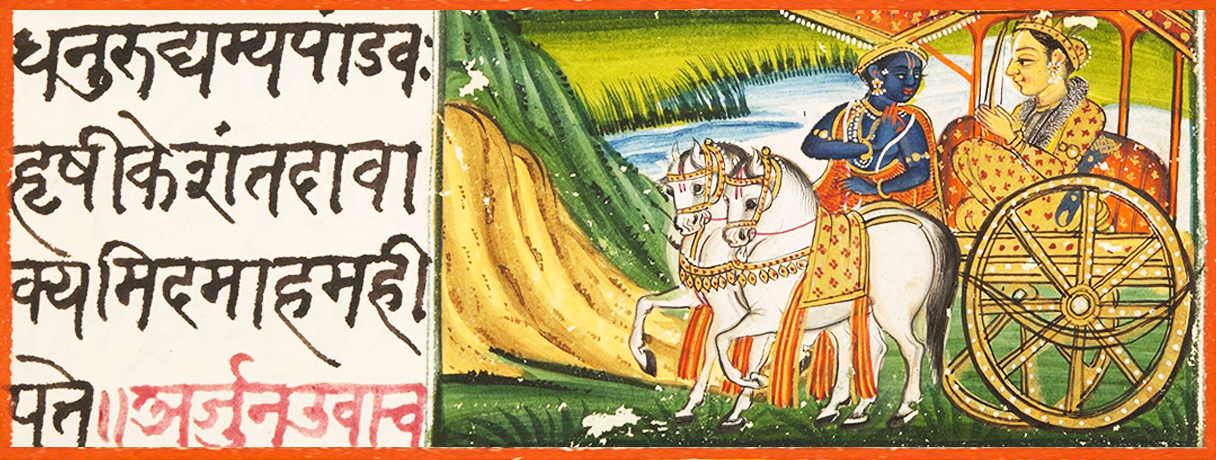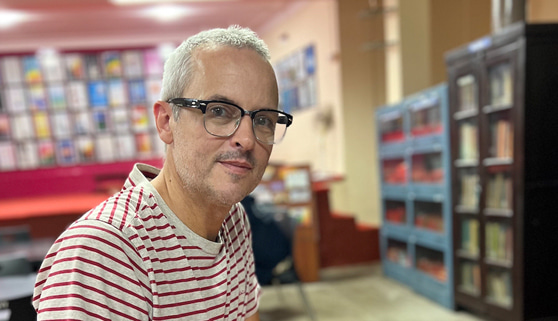
My Sanskrit Journey and New Course
26 March 2024
I've been practising haṭhayoga for nearly 25 years and teaching it since 2007. In my 20s and 30s, I spent a fair amount of time in India and studied yoga within a traditional ashram setting. I found that I enjoyed chanting Sanskrit mantras, and when I became a yoga teacher, I felt it was important to use Sanskrit terminology wherever possible. After all, if someone goes to a Kung Fu class, they expect the teacher to know the Chinese names of the moves. Similarly, a ballet student would be fairly nonplussed if their teacher was unable to pronounce relevant French terms correctly. Why should a yoga class be any different? When, in 2021, I started an MA in Traditions of Yoga and Meditation at SOAS, University of London, I'd been teaching yoga for 14 years and therefore thought that my Sanskrit was reasonably proficient. I was in for a pretty big shock! I soon discovered just how little I really knew of this enigmatic language and how badly I was mispronouncing many, even fairly basic, terms. Until then, like the majority of non-Indian yoga teachers, I simply didn't know what I didn't know. So, I enrolled on as many Sanskrit modules as possible and began studying Sanskrit fairly intensely with an incredible Sanskritist and Phonologist, Dr Lidia Wojtczak.
The effect on my yoga teaching was transformative. I gained a new confidence and strength of voice. The Sanskrit words began to have new resonance and significance. I started to feel like I knew what I was talking about! At least, when I recited a Sanskrit śloka or used the name of a difficult-to-pronounce mudrā. (Nb: its 'mudraa' - short 'u' long 'a', not 'moo-dra' as commonly mispronounced by yoga teachers). I also found my understanding of yogic concepts deepening through a new comprehension and appreciation of the language in which those ideas are encoded. I've come to realise that some form of Sanskrit training is essential for any serious student of yogic philosophy. However, although Sanskrit is a truly wonderful language, its complex grammar system takes many years or even decades to master. Although I've now completed my MA and received distinctions in the Sanskrit modules and an overall distinction, I am still learning and am by no means an expert. Since completing the MA in September 2023, I've completed two further modules in postgraduate Sanskrit, and next term, I will continue to study at the SOAS Language Centre and will be reading and translating sections of the Rāmāyaṇa. Although still a student, I'd like to help other yoga teachers who, like myself a few years ago, want to develop their Sanskrit but may not know where to start or may not have access to the right resources. I am therefore offering a new six-week, online 'ABC' of Sanskrit for Yoga Teachers, trainees and kīrtan leaders. We will look at the fundamental principles of pronunciation, reading Devanāgarī and transliteration, basic grammar, sandhi rules and mantra recitation. We will also take time to explore the yogic terminology of āsana, mudrā and prāṇāyāma techniques and many of the common mistakes yoga teachers make.
This course will equip you with the fundamentals of the Sanskrit language. It's called the 'ABC' of Sanskrit - because it's aimed at complete beginners, which most of us are. Whilst it is unlikely that by the end of this short course, you'll be translating the Bhagavadgīta or chatting fluently to Sanskrit pundits, you will undoubtedly feel more confident in using this beautiful language, and I sincerely hope that it will spark your curiosity for further Sanskrit study. The first course starts in June and is limited to ten places. Concessions are available for students and people on low incomes. To book your place, please follow the link below.
Like this article?
Then why not share it with others who may enjoy reading it too:
